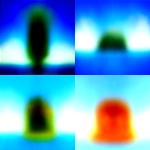Explore the Best AI Image Gallery

Quantum Quills: How Quantum Computing is Reimagining Creativity
The realm of creativity has long been defined by human ingenuity and imagination. But now, a new force is poised to reshape this landscape – quantum computing. This groundbreaking technology, with its ability to process information in ways unimaginable for classical computers, holds the potential to revolutionize how we create, express ourselves, and experience art.
From generating novel musical compositions to designing immersive virtual worlds, quantum computing is poised to become a powerful tool in the hands of artists, designers, and innovators.
Unlocking New Creative Frontiers
Imagine a composer who can tap into the vast computational power of quantum computers to generate symphonies with intricate harmonies and unexpected melodies. Or envision an architect using quantum algorithms to design buildings that adapt to their environment in real-time, optimizing for energy efficiency and structural integrity.
- Music Composition: Quantum computers could analyze vast musical libraries and generate entirely new compositions, exploring complex harmonies and rhythms beyond human comprehension.
- Art Generation: Artists could leverage quantum algorithms to create stunning visual artworks, from abstract paintings to hyperrealistic digital renderings, pushing the boundaries of artistic expression.
- Design Optimization: Architects, engineers, and product designers can utilize quantum computing to optimize designs for functionality, aesthetics, and sustainability, creating innovative solutions with unparalleled precision.
Ethical Considerations in the Quantum Age
As with any powerful technology, the rise of quantum computing raises important ethical considerations. Its crucial to ensure that its applications in the creative industry are used responsibly and equitably:
- Bias and Fairness: Quantum algorithms are trained on data, and if that data reflects existing societal biases, the resulting creative outputs could perpetuate these inequalities.
- Ownership and Authorship: When AI systems generate creative content, questions arise about ownership and attribution. Who owns the copyright to a painting created by a quantum computer?
- Accessibility and Inclusivity: Access to quantum computing resources should be equitable, ensuring that all creatives, regardless of their background or resources, can benefit from this transformative technology.
The Quantum Canvas of Tomorrow
The future of creativity in the age of quantum computing is brimming with possibilities. We can expect:
- Increased Collaboration: Quantum computing will facilitate seamless collaboration between humans and AI, allowing artists to explore new creative avenues and push the boundaries of innovation.
- Personalized Creative Experiences: Imagine art that adapts to your emotions or music that evolves based on your preferences, creating truly personalized and immersive experiences.
- New Artistic Mediums: Quantum computing will undoubtedly give rise to entirely new artistic mediums, blurring the lines between the physical and digital worlds and expanding our understanding of what art can be.
As we stand on the precipice of this quantum revolution, its essential to embrace its potential while navigating its ethical complexities. By fostering responsible development and equitable access, we can ensure that quantum computing empowers creatives to unlock new frontiers of imagination and bring forth a future where art and technology converge in harmonious symbiosis.





](https://images.ai-img.art/thumbnails/150/436f6ba43486e74036bdddb4cf7a1d813975ad7387597ac869e49f718159fdf9.webp)